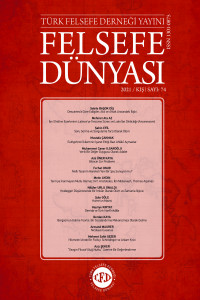Abstract
In Heidegger’s thought, the issue of death is subject to extremely decisive, striking and shocking analyzes. Heidegger develops an approach that states that the possibility of a human being to understand himself as a whole is death. As a whole whose beginning is determined by his birth and whose end is determined his death, man can only be understood through death. So death is man’s most significant possibility of existence. In Heidegger’s thought, on the one hand, man is defined as being-towards-death (Sein zum Tode); on the other hand, he is described as the only being that has the ability to “ahead of his death” before he dies. The holistic nature of man, in which his care structure and his concern for himself, other people, and objects are disclosed, is established by temporality. Since ecstatic temporality is not a series of nows, one can hang towards the future and from there comes back to his own possibility (past) and esatablishes the present. Thus, temporality (Zeitlichkeit) constituted by three interwined tenses appears before us as the condition for Dasein to encounter its own death and thus to understand itself as a whole by freeing itself from the scattering of past, future, and present. This article will present our thoughts on Heidegger’s analysis of death and itd relation to temporality.
Keywords
death Dasein temporality being-towards-death anticipate care
References
- Alweiss, L. (2002). Heidegger and Concept of Time, History of Human Sciences, Sage Publications, 121-130.
- Augustinus. (1996). Zaman Kavramı, (Saffet Babür. Çev.), Ankara: İmge Yayınları.
- Duman, M. (2009). Varlık ve Zaman’ı Heidegger’in Metafizik ve Nihilizm Tartışmasının Arkaplanı Olarak Okumak, Felsefe Dünyası, 2009/2, 215-242.
- Heidegger, M. (1990). Kant and the Problem of Metaphysics, (Richard Taft,Trans.), USA: Indiana University Press.
- Heidegger, M. (2008). Varlık ve Zaman, (Kaan H. Ökten. Çev.) İstanbul:Agora Kitaplığı Yayıncılık.
- Heidegger, M. (1996). Zaman Kavramı, (Saffet Babür. Çev), Ankara: İmge Yayıncılık.
- White, C. J. (2005). Time and Death, Newtork: Ashgate. Ökten, K. H. (2019). Varlık ve Zaman Bir Okuma Rehberi, İstanbul: Alfa Yayınları.
- Ricoeur, P. (2016). Zaman ve Anlatı 4, (Umut Öksüzan, Atakan Altınörs, Çev.), İstanbul: Yapı Kredi Yayınları.
- Dastur, F. (1990). Heidegger and the Question of Time, (François Raffould and David Pettigrew, Translate), Paris: Humanity Books.
- Levinas, E. (2014). Ölüm ve Zaman, (Nami Başer, Çev.), İstanbul: Ayrıntı Yayınları.
- Barret, W. (2008). Heidegger:Toplu Bakış, Heidegger Kitabı, (Ahmet Aydoğan, Çev.), A. Aydoğan (Ed.), İstanbul: Say Yayınları.
- Schrag, C. O. (2006). Heidegger Felsefesinde Fenomenoloji, Varlıkbilim ve Tarih, (Serdar Şen Çev.). ÇTTAD, V/13.
Abstract
Heidegger düşüncesinde ölüm meselesi son derece belirleyici, çarpıcı ve sarsıcı analizlere konu edilir. Heidegger insanın kendini bir bütün olarak anlamasının imkânının ölüm olduğunu söyler. İnsan, başı doğumuyla, sonu ölümüyle belirlenen bir bütün olarak, ancak ve sadece, ölüm sayesinde anlaşılabilir. Öyleyse ölüm insanın en büyük varoluş imkânıdır. Heidegger düşüncesinde, bir yandan insan ölüme-doğru-varlık (Sein zum Tode) olarak tanımlanırken, diğer taraftan ölmeden evvel “ölümünü önceleyebilme” olanağına sahip tek varlık olarak tasvir edilir. İnsanın ihtimam-gösterme (Sorge) yapısı ile kendisine, diğer insanlara ve nesnelere yönelik ilgisinin ifşa edildiği bütünselliği zamansallıkla kurulur. Ekstatik zamansallık şimdilerden oluşan bir dizi olmadığı için insan geleceğe doğru sarkabilmekte ve oradan kendi oldum-olasılığına (geçmişine) geri gelmekte ve şimdiyi kurmaktadır. Böylece birbirine geçmiş üç zaman kipi ile kurulu zamansallık (Zeitlichkeit) Dasein’ın kendi ölümüyle karşılaşmasının ve böylece kendini geçmiş, gelecek ve şimdinin saçılmışlığından kurtarmak suretiyle bir bütün olarak anlamasının koşulu olarak karşımıza çıkar. Bu makalede Heidegger’in ölüme ilişkin analizlerine yer vererek ölümün zamansallık ile ilişkisine dair düşüncelerimizi ortaya koyacağız.
References
- Alweiss, L. (2002). Heidegger and Concept of Time, History of Human Sciences, Sage Publications, 121-130.
- Augustinus. (1996). Zaman Kavramı, (Saffet Babür. Çev.), Ankara: İmge Yayınları.
- Duman, M. (2009). Varlık ve Zaman’ı Heidegger’in Metafizik ve Nihilizm Tartışmasının Arkaplanı Olarak Okumak, Felsefe Dünyası, 2009/2, 215-242.
- Heidegger, M. (1990). Kant and the Problem of Metaphysics, (Richard Taft,Trans.), USA: Indiana University Press.
- Heidegger, M. (2008). Varlık ve Zaman, (Kaan H. Ökten. Çev.) İstanbul:Agora Kitaplığı Yayıncılık.
- Heidegger, M. (1996). Zaman Kavramı, (Saffet Babür. Çev), Ankara: İmge Yayıncılık.
- White, C. J. (2005). Time and Death, Newtork: Ashgate. Ökten, K. H. (2019). Varlık ve Zaman Bir Okuma Rehberi, İstanbul: Alfa Yayınları.
- Ricoeur, P. (2016). Zaman ve Anlatı 4, (Umut Öksüzan, Atakan Altınörs, Çev.), İstanbul: Yapı Kredi Yayınları.
- Dastur, F. (1990). Heidegger and the Question of Time, (François Raffould and David Pettigrew, Translate), Paris: Humanity Books.
- Levinas, E. (2014). Ölüm ve Zaman, (Nami Başer, Çev.), İstanbul: Ayrıntı Yayınları.
- Barret, W. (2008). Heidegger:Toplu Bakış, Heidegger Kitabı, (Ahmet Aydoğan, Çev.), A. Aydoğan (Ed.), İstanbul: Say Yayınları.
- Schrag, C. O. (2006). Heidegger Felsefesinde Fenomenoloji, Varlıkbilim ve Tarih, (Serdar Şen Çev.). ÇTTAD, V/13.
Details
| Primary Language | Turkish |
|---|---|
| Subjects | Philosophy |
| Journal Section | Research Articles |
| Authors | |
| Publication Date | December 15, 2021 |
| Submission Date | August 20, 2021 |
| Published in Issue | Year 2021 Volume: 2 Issue: 74 |
Philosophy World is licensed under a Creative Commons Attribution-NonCommercial 4.0 International License.


